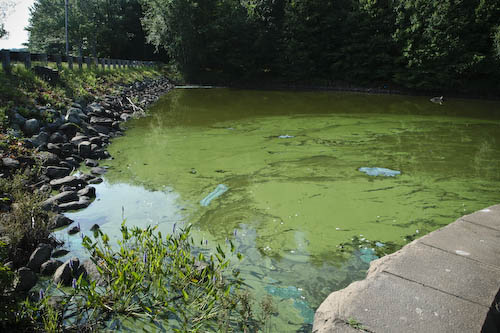Above: This photo is from years ago, but doesn’t look much different that a view I noticed while driving in town recently. Given news about issues at Hopkinton State Park, I’d keep pets away from our reservoirs, too. (Although, dogs should always stay away from the MWRA land.) (photo by Susan Fitzgerald)
Mosquitoes/EEE
The state completed the aerial pesticid spraying for Worcester and Middlesex county. That doesn’t mean the EEE threat is resolved. At this stage, the community is still urged to take precautions – especially around dusk and dawn. And that means the prohibition on field use between 6:00 pm and 6:00 am still stands.
Bacteria in algae blooms
Hopkinton State Park is closed to swimmers and boaters due to the high level of a dangerous bacteria in the water – Cyanobacteria.
I’ll share those details below, but first. . .
A friend asked if the reservoirs in town are tested for the bacteria. She was concerned about dogs that could get seriously ill or die after swimming. Public Works couldn’t answer that question, since the reservoir is under the jurisdiction and testing of the MWRA. That agency hasn’t posted any warnings about the Sudbury Reservoir. However, swimmers and dogs are prohibited from using the reservoir. Because the reservoir is a source for drinking water, dogs aren’t even allowed to walk the reservoir areas.
The reservoir does allow fishing though. And I’d avoid doing that these days based on having observed green algae in some areas. I don’t know that the bacteria is high, but I wouldn’t risk it without a notice that testing came up negative.
As for our neighboring swimming hole, here is WHDH’s coverage of the issue:
Swimmers and dog owners are being urged to avoid the water at Hopkinton State Park amid a toxic blue-green algae bloom, according to state officials.
The Massachusetts Department of Conservation and Recreation said they have found high levels of Cyanobacteria in the reservoir and beach areas.
The state also issued a warning to pet owners to keep their pooches away from the shoreline.
Earlier this month, three dogs in North Carolina died after they swam in a lake that contained the toxic bacteria, according to their owner.
Cyanobacteria can live in both fresh and saltwater, according to health officials. It typically multiplies and blooms when the water is warm.
Drinking or even swimming in the infected water can lead to nausea, fever, headaches, diarrhea and mouth ulcers, according to the Center for Disease Control.
The blue-green algae has also bloomed in New Jersey lakes and even in New York City parks.
“I just never really thought that it was harmful to anybody or animals,” one woman said. “I just thought it was part of nature.”
The Department of Public Health will continue to retest the bacteria levels at the state park until they are within the state’s acceptable limits.
Until then people and their pets should avoid all contact with the water.



Perhaps Public Works should find out about the danger of this algae, and report back to the residents in town. To be informed, and warned by the authorities, that’s their job.
SERIOUSLY?
In case you are not aware, Canadian geese regularly visit that reservoir and their number is typically 80 – 100 geese. They stay for a few days to a week or more at a time – and defecate everywhere. It’s particularly noxious in the winter when one can easily see the amount of fecal matter they leave on the ice. And that’s just what is left on the ice – what about the feces that go directly into the water?
I’ve researched the issue and found that an average Canadian goose eats ~4 lbs. of plant matter a day and excretes ~3 lbs. of that in the same period. Now, doing a bit of math we find that 100 geese are creating 300 lbs. of feces per day. Since they typically stay for at least a week, that yields 2100 lbs. of geese feces in a week! Now multiply that ton of waste by the number of weeks these birds visit the area.
Can you say public health nuisance?
I feel sorry for the people who own homes whose yards border the reservoir. Their back yards are frequented by the Canadian geese as well. These owners have reported to me after a geese invasion, their yards are unusable.
The Sudbury reservoir is supposed to be a backup system for Boston. I’ve also read that the geese feces can carry a number of pathogens including:
* crystoporidium
* giardia
* toxoplasmosis
* other nematode infections
* campylobacter jejuni
* chlamydiosis
* e-coli
* listeria
* pasteurella multocida
* salmonella
* avian influenza
* encephalatic viruses
* histoplasmosis
I would advise DCR and property owners abutting these reservoir bodies to invest in the amber strobing light systems designed to discourage geese from visiting these reservoir sites.
I worked in an office building near a body of water and the landlord installed such a system to combat the ‘geese feces everywhere’ issue. I am pleased to report that after a very few months, the system had worked. No more geese and no more feces (everywhere!!!).
So…where do they go?
Yes, this is an excellent idea. Maybe we should just issue goose hunting licenses. Better yet, let’s reuse that money from amber strobing lights and invest in anti-aircraft geese weapons. Get ’em before they even fly over the town.
Perhaps Don’t rush and blame public works – it falls under DCR with reservoirs- learn your town and states departments and it’s responsibilities . And that’s more than I needed to know about goose poop and strobe lights. Move on people.
Here is a link that shows all of Southborough well within boundaries of aerial spraying for EEE to be done this evening, September 10, 2019. https://massnrc.org/spray-map/MidWorNorSept2019.htm?fbclid=IwAR3fZDPoE-n9-OfrcGY_29X-Md0fpoEieXgO0k7VSIT2iQkdyIP6kaggB5E
I did see that and just posted the story.